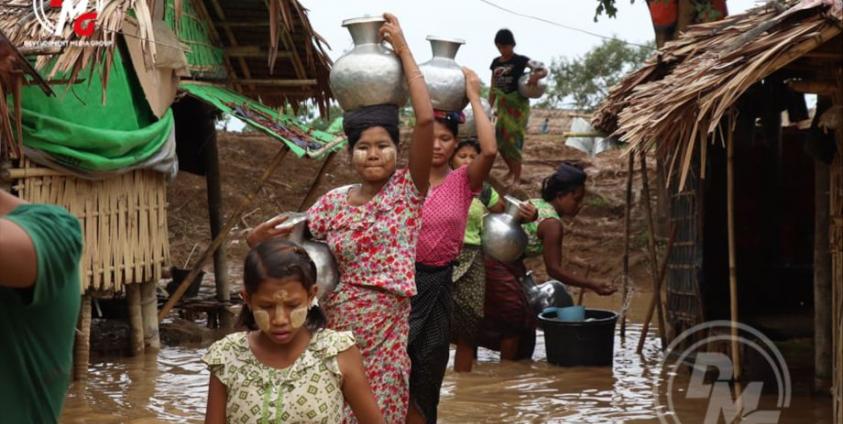In certain Internally Displaced Persons (IDP) camps and villages in Rakhine State, women are resorting to traditional methods instead of using sanitary pads during menstruation.
The women in the IDP camp mentioned that due to the increasing prices of sanitary pads and economic hardships, they have resorted to traditional practices. These methods involve using folded clothes and layering traditional women's garments, known as "htamain," on top of each other, instead of relying on sanitary pads.
In the Taung Min Kalar IDP camp, located in Kyauktaw Township, there are around 280 women out of a total population of over 470. These women resort to traditional methods to address menstrual hygiene due to financial constraints, refraining from using sanitary pads.
"Some women are concerned about the negative perception associated with using traditional methods, which makes them feel ashamed. This has also led to employed women avoiding work during their menstrual periods," explained Ma Aye Khin, a person displaced by the conflict.
In August, an organization visited Taung Min Kalar IDP camp and provided each household with one large package and one small package of sanitary pads. Despite this assistance, there remains an ongoing need for sanitary pads due to the lack of a consistent supply.
War-displaced individuals rely on support from donors and organizations for their livelihoods, as they lack a sustainable source of income. Consequently, they often resort to traditional methods for managing menstruation due to the unavailability of sanitary pads.
In Rathedaung Township, specifically at the Zedi Taung (West) IDP camp, where there is a female population of 372, women aged over 30 are also resorting to traditional methods to manage menstruation.
"Even female students struggle to afford and use sanitary pads regularly. When they need four pads a day, they must manage with just one for the entire day. They can't afford to buy as many as they require," shared Ma May Su Hlaing, a person displaced by the conflict.
In Rakhine State, alongside the increasing prices of basic commodities, the cost of female sanitary pads has nearly doubled.
Previously, a package of "Blue" brand sanitary pads was priced at 500 kyats, but now it has doubled to 1,000 kyats. Similarly, a package of "Pyo May" brand sanitary pads, which used to cost 1,000 kyats, has now risen to 1,500 kyats.
"The cost of living has risen, and many families are experiencing financial hardship. Families that rely on manual labor are particularly struggling to make ends meet. Women in these families often resort to traditional methods during menstruation because they cannot afford sanitary pads," explained Ma Oo Mya Aye from Kyauk Khoke Village, Minbya Township.
Health professionals recommend changing sanitary pads at least three times daily to prevent female genital irritation, fungal infections, and urinary tract infections that can result from infrequent changes.
"Women who rely on traditional methods may wash their cloth substitutes diligently, but these items may not be entirely clean, and with prolonged use, they can become soiled. During the rainy season and winter, when sunlight is scarce, the dampness in these clothes can promote the growth of harmful germs, potentially leading to various health issues," explained a female health worker from Ponnagyun Township.
Furthermore, she emphasized that relying on traditional methods instead of sanitary pads during menstruation should not be a long-term solution.
However, women in rural areas and IDP camps have limited or no daily income, making it difficult for them to allocate extra funds for sanitary pads.








